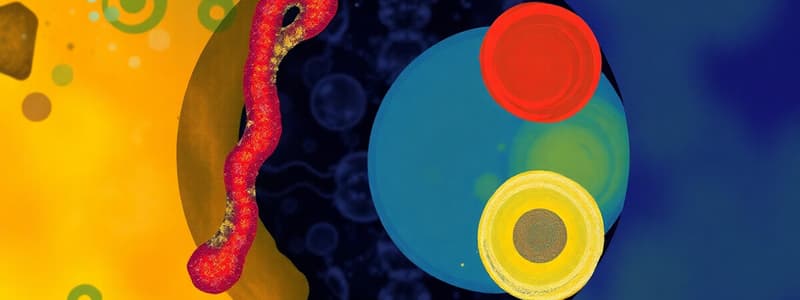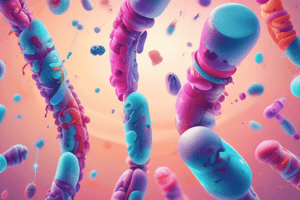Podcast
Questions and Answers
What is the main event that occurs during prophase I of meiosis?
What is the main event that occurs during prophase I of meiosis?
- Bivalents align on the metaphase plate
- DNA synthesis occurs
- Sister chromatids separate
- Tetrads form by synapsis (correct)
Which of the following statements is true about anaphase I of meiosis?
Which of the following statements is true about anaphase I of meiosis?
- Centromeres divide and sister chromatids move apart
- Bivalents are positioned at the metaphase plate
- Sister chromatids are separated from each other
- Homologous chromosomes move to opposite poles (correct)
What characterizes metaphase I during meiosis?
What characterizes metaphase I during meiosis?
- Bivalents orient at random on the equatorial plane (correct)
- Centromeres do not separate
- Sister chromatids align at the equatorial plane
- Tetrads do not align at random
During which stage of meiosis are the homologous chromosomes held together by spindle fibers?
During which stage of meiosis are the homologous chromosomes held together by spindle fibers?
What occurs during telophase I of meiosis?
What occurs during telophase I of meiosis?
What is the difference between interkinesis and interphase preceding mitosis?
What is the difference between interkinesis and interphase preceding mitosis?
What is the term for the number of chromosome sets in somatic cells?
What is the term for the number of chromosome sets in somatic cells?
In eukaryotic organisms, which pair describes the maternal and paternal contributions to chromosome sets?
In eukaryotic organisms, which pair describes the maternal and paternal contributions to chromosome sets?
Which protein is primarily responsible for organizing DNA into nucleosomes?
Which protein is primarily responsible for organizing DNA into nucleosomes?
What distinguishes the p arm from the q arm in chromosomes?
What distinguishes the p arm from the q arm in chromosomes?
What type of nuclear division does mitosis represent?
What type of nuclear division does mitosis represent?
Which type of cells contain half the number of chromosome sets as somatic cells?
Which type of cells contain half the number of chromosome sets as somatic cells?
Which statement correctly describes the function of the centromere?
Which statement correctly describes the function of the centromere?
How can chromosomes be differentiated beyond genetic content?
How can chromosomes be differentiated beyond genetic content?
What is the chromatin?
What is the chromatin?
What process leads to the physical division of the cytoplasm in animal cells during telophase?
What process leads to the physical division of the cytoplasm in animal cells during telophase?
Which phase of meiosis is characterized by homologous chromosomes pairing up in a process known as synapsis?
Which phase of meiosis is characterized by homologous chromosomes pairing up in a process known as synapsis?
What structure is absent in plant cells during mitosis?
What structure is absent in plant cells during mitosis?
During which division of meiosis does the chromosome number change from diploid to haploid?
During which division of meiosis does the chromosome number change from diploid to haploid?
During which phase of mitosis are chromosomes most condensed and easily observable under a light microscope?
During which phase of mitosis are chromosomes most condensed and easily observable under a light microscope?
What is the result of crossing over during Prophase I of Meiosis I?
What is the result of crossing over during Prophase I of Meiosis I?
What is the term used to refer to the paired homologous chromosomes during meiosis?
What is the term used to refer to the paired homologous chromosomes during meiosis?
What chemical can halt mitosis at late prophase by interfering with spindle fiber assembly?
What chemical can halt mitosis at late prophase by interfering with spindle fiber assembly?
What is the role of the centromere during mitosis?
What is the role of the centromere during mitosis?
In which phase do sister chromatids get separated during meiosis?
In which phase do sister chromatids get separated during meiosis?
What shape do metacentric chromosomes typically appear as during anaphase?
What shape do metacentric chromosomes typically appear as during anaphase?
What is the primary difference between the two meiotic divisions?
What is the primary difference between the two meiotic divisions?
What two processes are key contributors to genetic variation in meiosis?
What two processes are key contributors to genetic variation in meiosis?
Which process directly follows the separation of sister chromatids?
Which process directly follows the separation of sister chromatids?
What major event is characteristic of anaphase?
What major event is characteristic of anaphase?
What is the outcome of meiosis in terms of cell type and chromosome number?
What is the outcome of meiosis in terms of cell type and chromosome number?
In animal cell division, which structure is formed to achieve cytokinesis?
In animal cell division, which structure is formed to achieve cytokinesis?
What happens to the nuclear membrane during late prophase?
What happens to the nuclear membrane during late prophase?
Which description accurately characterizes the spindle apparatus during prophase?
Which description accurately characterizes the spindle apparatus during prophase?
What is produced during the S phase of the cell cycle?
What is produced during the S phase of the cell cycle?
Which phase of the cell cycle is primarily dedicated to the preparation for mitosis?
Which phase of the cell cycle is primarily dedicated to the preparation for mitosis?
What happens to spindle fibers during telophase?
What happens to spindle fibers during telophase?
During which stage of mitosis do the spindle fibers attach to the centromeres?
During which stage of mitosis do the spindle fibers attach to the centromeres?
What role do centrioles play in mitosis?
What role do centrioles play in mitosis?
What happens to chromosomes during the G2 phase?
What happens to chromosomes during the G2 phase?
Which phase of Interphase typically lasts the shortest?
Which phase of Interphase typically lasts the shortest?
How long does mitosis generally take in an ideal animal cell within the total cell cycle?
How long does mitosis generally take in an ideal animal cell within the total cell cycle?
What characterizes the Interphase portion of the cell cycle?
What characterizes the Interphase portion of the cell cycle?
What is the primary function of spindle fibers during mitosis?
What is the primary function of spindle fibers during mitosis?
What defines the M phase in the cell cycle?
What defines the M phase in the cell cycle?
Flashcards
Chromosome
Chromosome
Thread-like structure carrying genetic information, composed of DNA and proteins.
Chromatin
Chromatin
The DNA-protein complex that forms chromosomes.
Histone
Histone
Protein that organizes DNA into nucleosomes.
Centromere
Centromere
Signup and view all the flashcards
Mitosis
Mitosis
Signup and view all the flashcards
Cell cycle
Cell cycle
Signup and view all the flashcards
Interphase
Interphase
Signup and view all the flashcards
Prophase
Prophase
Signup and view all the flashcards
Metaphase
Metaphase
Signup and view all the flashcards
Anaphase
Anaphase
Signup and view all the flashcards
Telophase
Telophase
Signup and view all the flashcards
Cytokinesis
Cytokinesis
Signup and view all the flashcards
Meiosis
Meiosis
Signup and view all the flashcards
Gamete
Gamete
Signup and view all the flashcards
Synapsis
Synapsis
Signup and view all the flashcards
Crossing over
Crossing over
Signup and view all the flashcards
Haploid
Haploid
Signup and view all the flashcards
Diploid
Diploid
Signup and view all the flashcards
Prophase I
Prophase I
Signup and view all the flashcards
Metaphase I
Metaphase I
Signup and view all the flashcards
Anaphase I
Anaphase I
Signup and view all the flashcards
Telophase I
Telophase I
Signup and view all the flashcards
Meiosis II
Meiosis II
Signup and view all the flashcards
Study Notes
Chromosome Morphology
- Chromosomes are thread-like structures containing genetic information, composed of DNA associated with proteins.
- The DNA-protein complex is called chromatin.
- Histones help organize long DNA strands into nucleosomes.
Chromosome Characterization
- Chromosomes are distinguished by their length and the position of the centromere.
- The centromere divides the chromosome into two arms: p arm (shorter) and q arm (longer).
Mitosis
- Non-reductional division producing two identical daughter cells with the same chromosome number as the parent cell.
- Spindle fibers attach to centromeres, dividing the duplicated chromosomes (chromatids) into separate cells.
End Results of Mitosis
- Produces an exact copy of each chromosome.
- Distributes an identical set of chromosomes to each daughter cell.
The Cell Cycle
- Consists of a short mitotic (M) phase and a longer interphase.
- Interphase is divided into three phases: G1, S, and G2.
- Cell growth and protein/organelle production occur throughout interphase.
- DNA replication occurs exclusively during the S phase.
Interphase
- Cells prepare for mitosis in the G2 phase.
- Chromosomes condense in the G2 phase.
- A cell entering the G1 phase is committed to completing the cell cycle.
- Interphase is when condensed chromosomes are not visible under a microscope.
- Mitosis is the shortest phase of the cell cycle.
Formation of the Mitotic Apparatus: Prophase
- Centrioles (present in animal cells) initiate and organize the mitotic apparatus, composed of asters and spindle fibers.
- Plant cells lack centrioles.
- Early prophase: Centrioles move apart; replicated sister chromatids condense and become visible under a microscope.
- Late prophase: Chromatids are held together by the centromere; nuclear membrane and nucleolus disappear.
Division of the Centromere: Metaphase
- Sister chromatids align at the spindle equator.
- Microtubules from opposite poles attach to each chromosome, pulling it to the equator.
Separation of the Chromatids: Anaphase
- Sister chromatids separate at the centromere.
- Chromosomes move to opposite poles due to spindle fiber contraction.
- The shape of the moving chromosome is determined by centromere position.
Reformation of Nuclei: Telophase
- Nuclear membranes reform around each daughter nucleus.
- Nucleolus reappears.
- Spindle fibers disappear.
- Cytoplasmic division (cytokinesis) occurs.
Cytokinesis
- Animal cells: A cleavage furrow forms and pinches the cell into two.
- Plant cells: A cell plate forms between the daughter cells.
Sexual Reproduction and Meiosis
- Involves the production of gametes, which fuse (fertilize) to form a zygote.
- In humans, male gametes are sperm, and female gametes are eggs (ova).
Meiosis
- Two consecutive cell divisions that reduce the chromosome number from diploid (2n) to haploid (n).
- Involves one DNA replication and two cytoplasmic divisions.
- Meiosis I is a reductional division that produces two diploid cells from a single diploid cell.
- Meiosis II is an equational division, similar to mitosis, separating sister chromatids of the diploid cells.
Characteristics of Meiosis I
- Replicated chromosomes condense.
- Homologous chromosomes pair during synapsis, forming bivalents or tetrads.
- Crossing over (exchange of genetic material between non-sister chromatids) occurs during synapsis.
Genetic Variation
- Recombination: Crossing over and independent assortment during metaphase I contribute to genetic variation.
Prophase I
- Divided into five stages: leptonema, zygonema, pachynema, diplonema, diakinesis.
Metaphase I
- Bivalents align randomly on the equatorial plane.
- Homologous chromosome pairing distinguishes this from mitotic metaphase.
Anaphase I
- Centromeres do not separate, holding sister chromatids together.
- Homologous chromosomes (each with two sister chromatids) move to opposite poles.
Telophase I
- Nuclear membranes reform.
- Chromosomes reach their polar destinations.
- Cytokinesis follows, producing two haploid daughter cells.
Meiosis II
- Interkinesis, the period between meiosis I and II, is brief or absent.
- No new DNA synthesis occurs during interkinesis.
Prophase II
- Chromosomes recondense.
- Spindle fibers reform.
Metaphase II
- Chromosomes attach to spindle fibers by centromeres.
- Chromosomes align on the metaphase plate.
Anaphase II
- Centromeres divide.
- Sister chromatids separate and move to opposite poles.
Studying That Suits You
Use AI to generate personalized quizzes and flashcards to suit your learning preferences.
Related Documents
Description
Explore the intricacies of chromosome morphology, characterization, and the process of mitosis. This quiz covers essential concepts of the cell cycle, including the organization of DNA and the stages of cell division. Test your understanding of how chromosomes function in cell replication.





